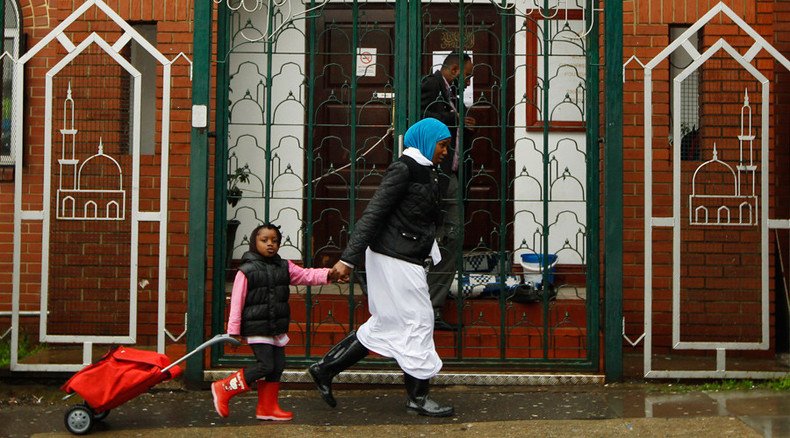Ethnic minority Brits hardest hit by Tory austerity budget

Chancellor George Osborne’s latest budget could cut the incomes of 4 million people from black and ethnic minority communities, with Muslims among the most severely-affected groups, a new report has found.
The study, conducted by racial equality think tank the Runnymede Trust, was published on Monday.
It found the latest phase of Osborne’s austerity agenda leaves ethnic minority Britons 200 percent more likely to lose money than their white counterparts. It also predicts child poverty among these groups will grow as the Conservatives push ahead with further welfare cuts.
#Osborne's budget makes #BritishMuslims poorer & will probably help #ISIS recruitment!! http://t.co/d9PAnTcWAY#olsxpic.twitter.com/l3bwdw5Jjb
— Occupy London (@OccupyLondon) July 27, 2015Trust Director Omar Khan, who authored the report, said the Conservatives’ budget risks entrenching racial inequality in Britain by stripping ethnic minority communities of their incomes faster than Caucasians.
Unveiled in early July, the budget is the first from a majority Conservative government since 1996.
On Wednesday, it emerged cash-strapped Whitehall departments could be forced to slash their budgets by up to 40 percent, as Osborne seeks to further privatize public services.
Osborne’s £20 billion (US$31 billion) worth of spending cuts planned over the next four years will be revealed in full in a spending review due to be published on November 25.
Tory plans to push ahead with further austerity have angered critics who warn of a rise of acute inequality in the UK. In a state increasingly characterized by precarious work and drastic welfare reforms, they argue further austerity will impact heavily on Britain’s most vulnerable.
.@RunnymedeTrust: four million BME individuals or 1.25 million households will be worse off due to the Tories' #Budget2015
— Chuka Umunna (@ChukaUmunna) July 27, 2015Although Runnymede’s report acknowledges the Tories’ pledge to raise the minimum wage to £9 per hour in 2020 for over-25s, it argues slashed tax credits and other welfare reforms will impact upon ethnic minority Brits more severely than white UK residents.
Following the release of Runnymede’s report, Khan said black and ethnic minority people are more likely to struggle financially after Osborne’s latest budget.
“While ethnic minorities form around 11 percent of households and 14 percent of the UK population, we expect them to be over 15 percent of households and around 25 percent of individuals worst affected by the budget,” he said.
Khan, who sits on the Department for Work and Pensions' (DWP) Ethnic Minority Employment Stakeholder Group, said this was due to a number of trends apparent in this demographic.
In particular, he said people from ethnic minority communities’ younger age, higher levels of child poverty, lower incomes, and greater levels of part-time work are relevant.
George Osborne's 'racist budget'....Give me strength http://t.co/CkvRdKEuEq
— Marcher Lord (@MarcherLord1) July 27, 2015Following detailed analysis of ethnic minority communities in Britain, the study found that reduced tax credits and welfare cuts will leave over 1.25 million households in financial turmoil. The report added the figure could be considerably higher, as its calculations could underestimate the impact of the Tories emergency budget.
Runnymede’s study predicts Osborne’s budget will compound racial inequality in Britain.
“The question isn’t whether government deliberately makes BME [black and minority ethnic] people worse off, but rather whether the effects of policies, directly or indirectly, increase racial inequality in reality,” it said.
Runnymede’s report also suggests those of Bangladeshi and Pakistani heritage will be particularly affected by Osborne’s budget.
As these ethnic minority communities have significantly lower incomes than other ethnic groups across the UK, they are 500 percent more likely to have their household incomes bolstered by tax credits than white UK residents.
Benefit changes will affect ethnic minorities more says Runnymede Trust. Treasury says has been considered http://t.co/EiDMzuBaj5
— Paul Lewis (@paullewismoney) July 27, 2015Men of Bangladeshi heritage are estimated to be seven times more likely than their white counterparts to work in part-time roles, with over 33 percent working in this capacity at present.
Meanwhile, 9 percent of Indian men, 10 percent of black Caribbean men, 12 percent of African and Chinese men and 18 percent of Pakistani men work in part-time roles across the UK.
Runnymede’s research suggests 50 percent of UK Bangladeshis will lose at least £1,000 in the wake of Osborne’s latest budget.
Institutional racism in UK condemning Black/Asian families into grinding poverty and profound economic disadvantage http://t.co/MHWvUVEvRY
— Lee Jasper (@LeeJasper) July 27, 2015“We anticipate up to half of Bangladeshi and Pakistani households will be worse off – around 750,000 individuals in just under 200,000 households,” Runnymede’s Omar Khan said.
“The figure will be a bit lower proportionally for black African households, but no fewer than 300,000 individuals and 100,000 households will be negatively affected.”
Runnymede has demanded the government carry out a racial equality audit following Osborne’s budget to determine its socio-economic effects.
The Treasury claims to be firmly committed to “equality considerations” as a policy-maker. It says its officials look at the potential impacts of policy changes on “protected groups,” and ministers are advised on related findings when policy decisions are made.
RT called the Treasury on Monday to ask whether it had performed a racial equality audit to examine the impacts of Osborne’s budget. No one was available to comment.












